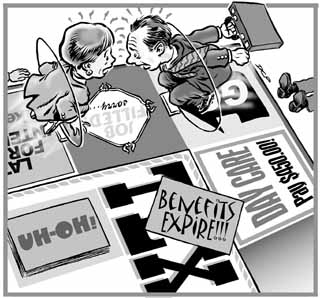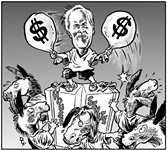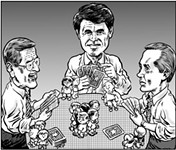Don't Lose Your Day Job
If You Think Health Insurance is Bad, Try Unemployment
By Michael King, Fri., March 22, 2002

Beneath the drone of permanent warfare, multiple scenarios for nuclear war, and the bipartisan refusal of Congress to interfere with our God-given right to foul the global air with low-mileage SUVs -- the news coming out of D.C. last week wasn't all bad. At least, if you're out of a job, you'll receive a 13-week extension on your unemployment benefits. So, if you're one of the 200,000 or so Texans already tapped out or about to exhaust your statutory 26 weeks of sustenance, you'll get a little more breathing room.
The extension was part of the $8 billion "stimulus package," which also included $594 million to bolster Texas' currently insolvent unemployment insurance (UI) trust fund. Failing that infusion of federal money, Texas would have had to borrow $300 million, as well as raise its payroll tax on businesses by $1.4 billion. Now the bite will be "only" $800 million -- an automatic tax hike triggered by the trust fund deficit, a consequence of the increase in Texas unemployment, which at an official 5.7% now exceeds the national rate (5.6%).
If you're wondering why the state's unemployment tax is designed so that it rises in times of recession -- presumably the moment you'd want to be lowering taxes -- the answer is, "That's the way we do it in Texas." "We have a system that fits a philosophy that is longstanding," said Larry Jones, spokesman for the Texas Workforce Commission, which administers the unemployment system. "We maintain a trust fund that's rather low in relation to the size of the wage base. We believe it's more beneficial to have our money flowing through the economy." No doubt coincidentally, Bill Hammond, president of the Texas Association of Businesses and Chambers of Commerce, shares Jones' opinion. "We do not believe you should take a lot of money out of the economy in advance of a need," Hammond told the San Antonio Express-News.
Representatives of working people are less enthusiastic. AFL-CIO President Joe Gunn said, "When our economy was humming, employers lobbied successfully to keep UI tax rates artificially low. Now, the system has a large deficit." AFL spokesman Ed Sills pointed to the spike in layoffs occasioned by 9/11, and added, "Our argument is that there should be an adequate level of tax to take care of rainy days."
When It Rains --
Since the Legislature doesn't employ that logic when it comes to the state budget -- its "rainy day" fund has a permanent hole in the bucket -- it's not surprising that the Texas UI system is similarly ill-prepared for recessions. That is just one of the system's deficiencies, confirmed this month by a national analysis issued by the Economic Policy Institute, the Center on Budget and Policy Priorities, and the National Employment Law Project. "Failing the Unemployed" graded the 50 states on five unemployment insurance standards: eligibility of workers for benefits, benefit levels, revenue sources, trust fund adequacy, and recession preparedness. Texas failed in four of the five categories, one of eight states so distinguished, and in the one category it "passed" (benefit levels), the maximum stipend is a whopping $45 a week greater than the poverty level for a one-parent, two-child family.
In these races to the bottom of the social scale, we usually count on Mississippi to bail Texas out of total disgrace. This time Mississippi is no worse than we are -- Alabama and Missouri bring up the rear, failing in all five categories. Nationwide, the picture is little better: 23 states fail in at least three categories, for a national shame that would generate daily headlines if it concerned the reading scores of third-graders. Yet the parents of many of those same children often move back and forth from underpaid jobs to desperate unemployment.
In Texas, the system is designed so that a majority of unemployed workers -- especially low-wage, temporary, and part-time workers -- cannot qualify for benefits at all. Compared to an already low national average of 43.3% of unemployed workers receiving benefits, in Texas only 29.8% of people out of work managed to qualify for benefits last year. In Texas, as in most states, says the Economic Policy Institute's Jeffrey Wenger, "Unemployment insurance isn't a true safety net but a series of gaping holes loosely strung together ... and many people are slipping through the holes entirely, with nothing to break their fall."
Some Modest Proposals
Much of the problem, says AFL-CIO legal director Rick Levy, is that the Legislature has traditionally treated unemployment compensation as though it is a welfare benefit instead of an insurance program. "You wouldn't expect your home insurers to constantly look for ways to disqualify people from receiving their insurance payments," Levy said, "but that's the way this system still works." Moreover, the system, created during the Depression, remains designed for a family model of a single breadwinner in a long-term occupation subject to occasional layoffs. "The labor market has radically changed, with many more part-time and temporary workers than ever before -- but the unemployment standards still only recognize full-time workers in continuing employment," Levy said.
Levy says four reforms could do a great deal to bring the Texas unemployment system into the 21st century: (1) The program should be fully funded, so that even mild recessions do not throw it out of fiscal balance; (2) There should be an "alternate base period" for calculating benefits, to allow recent and temporary workers to qualify; (3) Part-time workers should be allowed to qualify for benefits; and (4) There should be fairer adjudication of worker "misconduct."
The last category suggests an underlying reason why it remains so difficult to accomplish these simple reforms. Texas disqualifies unemployment applicants for alleged "misconduct" at a rate twice the national average, and appeals of such cases are heard by the three appointed Workforce Commissioners -- two who effectively represent business interests, one who represents labor.
When you consider how that ratio compares to the actual percentage of bosses vs. working stiffs in the "real world," it's easy to recall who rules Texas.
Got something to say on the subject? Send a letter to the editor.








